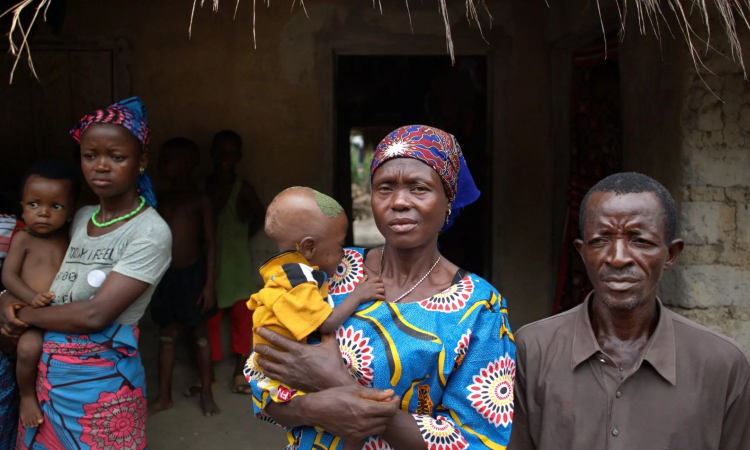Shifting Focus: Starvation easy-fix problem; really?
Sierra Leone has pioneered one innovation: It is the first country in Africa to give all pregnant women multiple prenatal vitamins, in effect reducing fetal malnutrition.

Middle East peace, climate change, Ukraine — if Sisyphus were assigned one of today’s global problems, he’d plead to be returned to rock rolling. So let’s focus for a moment on a global challenge that we can actually solve: starvation.
I suspect that some Americans — perhaps including President Trump — want to slash humanitarian aid because they think problems like starvation are intractable. Absolutely wrong! We have nifty, elegant and cheap solutions to global hunger.
Consider something really simple: deworming. I’m travelling through West Africa on my annual win-a-trip journey, in which I take a university student along on a reporting trip, and every day we see children plagued by worms that aggravate their malnutrition. Nutrients go to their parasites, not to them.
While worms are worthy antagonists — a female worm can lay 200,000 eggs in a day — aid agencies can deworm a child for less than $1 a year. This makes them stronger, less anaemic and more likely to attend school. Researchers have even found higher lifetime earnings.
In the US we spend considerable sums deworming pets; every year I spend $170 deworming my dog, Connie Kuvasz Kristof. Yet deworming the world’s children has never been as high a priority as deworming pets in the West, so we tolerate a situation in which one billion children worldwide carry worms.
My win-a-trip winner, Sofia Barnett of Brown University, and I are reminded in every village we visit of the toll of hunger. Malnutrition leaves more than one-fifth of children worldwide stunted, countless millions cognitively impaired and vast numbers (especially menstruating women and girls) weak from anaemia. Malnutrition is a factor in 45% of child deaths worldwide.
Yet we also see how these deaths can be inexpensively prevented.
In one Sierra Leone clinic, we met a 13-month-old boy, Abukamara, with sores and stick limbs from severe malnutrition. His mother, Mariatu Fornah, invited us to her village deep in the bush.
The family is impoverished and struggling. The parents and four children share a mattress in a thatch-roof mud-brick hut with no electricity, and no one in the family had eaten that day, even though it was early afternoon.
Fornah is doing what she can. She spent her entire savings of $3 and traded away a dress to get a traditional herb remedy for Abukamara, and she made the long trek to the clinic to get help. And there she found it — in the form of a miracle peanut paste. The clinic gave her a supply of the peanut paste, one foil packet a day, and it will almost certainly restore Abukamara.
This peanut paste contains protein, micronutrients and everything a child’s body needs, plus it tastes good and costs just $1 per child per day. Known by the brand name Plumpy’Nut or the ungainly abbreviation RUTF, for ready-to-use therapeutic food, it has saved millions of children’s lives over the years. The packets given to Abukamara were made in Rhode Island by Edesia Nutrition, which, along with Mana Nutrition in Georgia, is a leader in producing RUTF.
Rhode Island and Georgia might think of issuing license plates calling themselves the RUTF state, for I can’t imagine a prouder boast. The RUTF factories there keep children alive all over the globe — or they did until now.
Trump’s closure of the US Agency for International Development led to the cancellation of orders for RUTF, and 185,535 boxes of it are piled up in the warehouse of Edesia Nutrition, according to the firm’s founder and chief executive, Navyn Salem. The company hasn’t received a single new order for RUTF in 2025, she said.
Sierra Leone has done an excellent job of bringing down child mortality, partly by making RUTF widely available to help children like Abukamara. By shutting down USAID, we’re letting down these countries that have worked so hard to improve health care by adopting the latest science and innovation.
Sierra Leone has pioneered one innovation: It is the first country in Africa to give all pregnant women multiple prenatal vitamins, in effect reducing fetal malnutrition.
Investments in nutrition — along with others in vaccines and in treating diarrhoea, pneumonia and other ailments — help explain why fewer than half as many children die before the age of 5 now as in 2000.
Yet after leading the world in fighting malnutrition, the US may be surrendering the field. America used to be the world’s leading backer of nutrition, but the US government did not even send a formal delegation to the 2025 Nutrition for Growth Summit, a conference held every four years. The US was expected to host the next summit, but now that’s not clear.
In my journalistic career, I’ve seen children dying from bullets, malaria, cholera and simple diarrhoea, but perhaps the hardest to watch are kids who are starving. Their bodies have sores that don’t heal, their hair falls out, and their skin peels. By that point, even nourishing food doesn’t always bring them back.
What is most eerie is that such children don’t cry or protest; they are impassive, with blank faces. That’s because the body is fighting to keep the organs functioning and refuses to waste energy on tears or protests.
Their heads don’t move, but their eyes follow us silently, presumably wondering if we will care enough to ease their pain.
Mr Trump, will we?
©️The New York Times Company



